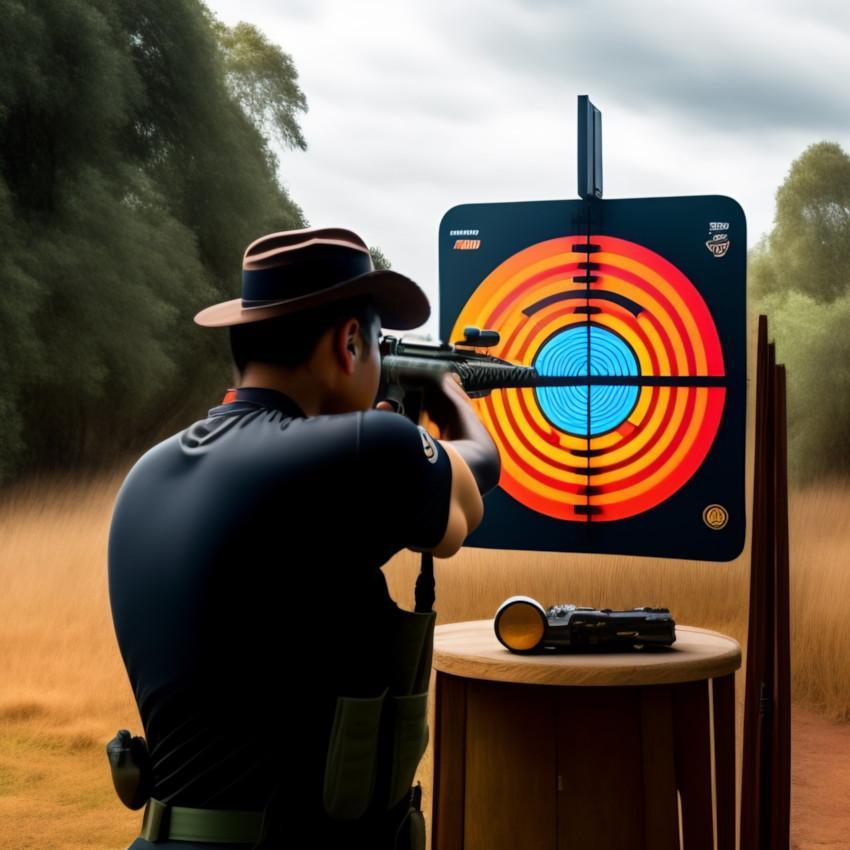


Shooting clubs are dynamic communities where precision meets camaraderie, fostering a shared passion for firearms, marksmanship, and responsible gun ownership. These clubs provide enthusiasts with a platform to hone their shooting skills, engage in friendly competition, and build lasting connections with like-minded individuals. In this comprehensive guide, we'll explore the world of shooting clubs, offering insights into their offerings, safety measures, and tips for maximizing your shooting experience.
The Heart of Shooting Clubs:
Shooting clubs are hubs for individuals who share a common interest in firearms, shooting sports, and responsible gun usage. These clubs often offer a variety of shooting disciplines, ranging from pistol and rifle shooting to skeet, trap, and competitive marksmanship.
Choosing the Right Shooting Club:
Selecting the right shooting club is crucial for a fulfilling experience. Consider factors such as the club's focus (e.g., pistol, rifle, or shotgun), available facilities, membership requirements, and the club's commitment to safety. Attend club events or open houses to get a feel for the community.
Safety First: Club Rules and Protocols:
Safety is paramount in shooting clubs, and adherence to rules and protocols is non-negotiable. Familiarize yourself with the club's safety guidelines, range rules, and emergency procedures. Always treat every firearm as if it's loaded, and follow proper handling and storage practices.
Marksmanship Training Programs:
Many shooting clubs offer marksmanship training programs for individuals of all skill levels. These programs, led by certified instructors, focus on fundamental shooting techniques, firearm safety, and advancing proficiency. Participating in training programs enhances skills and builds confidence.
Competitive Shooting Leagues:
Competitive shooting leagues within clubs provide opportunities for friendly competition and skill improvement. Whether it's precision pistol shooting, three-gun matches, or trap and skeet competitions, joining a league adds an exciting dimension to your shooting experience.
Introduction to Different Firearms:
Shooting clubs often provide opportunities to explore various firearms. Whether you're interested in handguns, rifles, or shotguns, the club environment allows you to try different models and calibers under the guidance of experienced shooters.
Understanding Shooting Disciplines:
Shooting clubs cater to a range of shooting disciplines, each with its unique challenges and requirements. Research and explore different disciplines such as IDPA (International Defensive Pistol Association), IPSC (International Practical Shooting Confederation), or NRA High Power Rifle to find the one that aligns with your interests.
Investing in Personal Equipment:
While shooting clubs often provide rental equipment, investing in your firearms and accessories can enhance your overall experience. Consider factors such as fit, recoil management, and purpose when choosing firearms, and consult experienced club members for advice.
Respecting Range Etiquette:
Range etiquette is a fundamental aspect of shooting club culture. Be mindful of range commands, follow designated shooting lanes, and respect the personal space of fellow shooters. Proper etiquette contributes to a safe and enjoyable shooting environment.
Socializing and Networking:
Shooting clubs are not just about marksmanship; they're also about building connections with fellow enthusiasts. Attend club events, participate in social gatherings, and engage in discussions to share experiences, tips, and knowledge within the community.
Volunteering and Club Contributions:
Consider volunteering your time or skills to contribute to the shooting club's activities. Many clubs rely on member support for events, range maintenance, and administrative tasks. Volunteering not only strengthens the community but also provides a sense of fulfillment.
Continual Learning and Improvement:
The world of shooting is vast and continually evolving. Embrace a mindset of continual learning by attending workshops, seminars, and training sessions. Stay informed about advancements in firearms technology, shooting techniques, and safety protocols to improve your skills over time.
Shooting clubs are organizations where individuals can practice and compete in various shooting sports. These clubs typically have rules and regulations that members must follow to ensure safety and fair play. Here is an overview of common shooting club rules:
Safety rules: Safety is the top priority in any shooting club. Members are required to follow all safety rules and procedures, including handling firearms safely, wearing appropriate protective gear, and using only authorized ammunition.
Membership requirements: Shooting clubs typically require members to be at least 18 years old, pass a background check, and complete a safety course. Some clubs may also require members to have a certain level of shooting experience.
Range rules: Shooting clubs often have designated shooting ranges where members can practice. Range rules may include restrictions on shooting hours, maximum range distances, and types of firearms that are allowed.
Competition rules: Shooting clubs may hold competitions for members to compete in various shooting sports. Competition rules may include guidelines on scoring, equipment restrictions, and eligibility requirements.
Etiquette: Shooting clubs may have etiquette guidelines to ensure a respectful and enjoyable environment for all members. This may include rules on communicating with other shooters, respecting other shooters' space, and cleaning up after oneself.
It's important to note that rules and regulations may vary depending on the shooting club and the type of shooting sport. It's always a good idea to familiarize oneself with the specific rules and regulations of a particular club before joining.
There are several types of shooting clubs, each with its own focus and membership requirements. Some common types include:
Rifle and Pistol Clubs: These clubs focus on the use of rifles and pistols, often for competitive shooting events.
Shotgun Clubs: These clubs focus on the use of shotguns, typically for skeet, trap, and sporting clays.
Archery Clubs: These clubs focus on the use of bows and arrows for target shooting, hunting, and other archery-related activities.
Black Powder Clubs: These clubs focus on the use of black powder firearms, such as muskets and muzzleloaders.
Cowboy Action Shooting Clubs: These clubs focus on the use of firearms from the late 1800s to the early 1900s, with members dressing in period attire and participating in shooting competitions.
Law Enforcement and Military Clubs: These clubs are typically open only to current and former law enforcement and military personnel and focus on developing and maintaining shooting skills for professional use.
Recreational Shooting Clubs: These clubs may focus on any type of shooting activity, including but not limited to rifle, pistol, shotgun, and archery. These clubs are often open to all skill levels and may also include social events and other activities.
Shooting clubs can offer a variety of knowledge and skills development opportunities related to firearms and shooting activities. Here are some examples:
Firearm safety: Shooting clubs typically prioritize firearm safety education and training, which can be invaluable for anyone who owns or uses firearms. This can include learning about the safe handling, storage, and transportation of firearms, as well as proper techniques for loading, unloading, and shooting.
Shooting skills: Shooting clubs can offer opportunities for members to develop their shooting skills, whether for recreational or competitive purposes. This can include training in marksmanship, accuracy, speed, and other aspects of shooting.
Shooting sports: Many shooting clubs focus on specific shooting sports, such as skeet, trap, or cowboy action shooting. Joining a shooting club can be a great way to learn about these sports, participate in competitions, and connect with other enthusiasts.
Legal and regulatory knowledge: Shooting clubs can provide valuable information and education about local, state, and national laws and regulations related to firearms ownership and use. This can be especially important for those who are new to firearms or who are unfamiliar with local regulations.
Before signing up for a shooting club, it's important to do your research and understand what the club offers and what is expected of its members. Here are some key things to consider:
Membership requirements: Shooting clubs may have specific requirements for membership, such as age, residency, or firearm ownership. Make sure you understand what is required to become a member.
Fees and costs: Shooting clubs may have membership fees, range fees, or other costs associated with participation. Make sure you understand what you will be expected to pay and when.
Rules and regulations: Shooting clubs typically have rules and regulations that members must follow, such as safety protocols or range rules. Make sure you understand these rules and are willing to abide by them.
Training and education: Find out what types of training and education the club offers, and determine whether these align with your interests and goals.
Reputation: Research the club's reputation and ask for references from current members. This can help you determine whether the club is a good fit for you.
The legality of shooting clubs varies by country, and in some cases, even by state or province within a country. In general, many countries allow for shooting clubs to exist and operate legally, as long as they comply with local laws and regulations related to firearms and shooting activities.
However, there are also countries where firearms ownership and shooting activities are heavily restricted or even banned altogether, which would also apply to shooting clubs. In some cases, shooting clubs may be allowed but with significant limitations, such as requiring membership in a national shooting federation or limiting the types of firearms or activities that are allowed.
Shooting clubs are dynamic spaces where precision, safety, and camaraderie converge. By choosing the right club, prioritizing safety, participating in training programs, and engaging with the community, you can enrich your shooting experience and contribute to the vibrant culture of responsible gun ownership. Whether you're a novice or an experienced shooter, the world of shooting clubs welcomes individuals who share a passion for firearms and marksmanship.
Sincerely yours,

We use cookies
We use cookies and other tracking technologies to improve your browsing experience on our website, to show you personalized content and targeted ads, to analyze our website traffic, and to understand where our visitors are coming from. Privacy Policy.